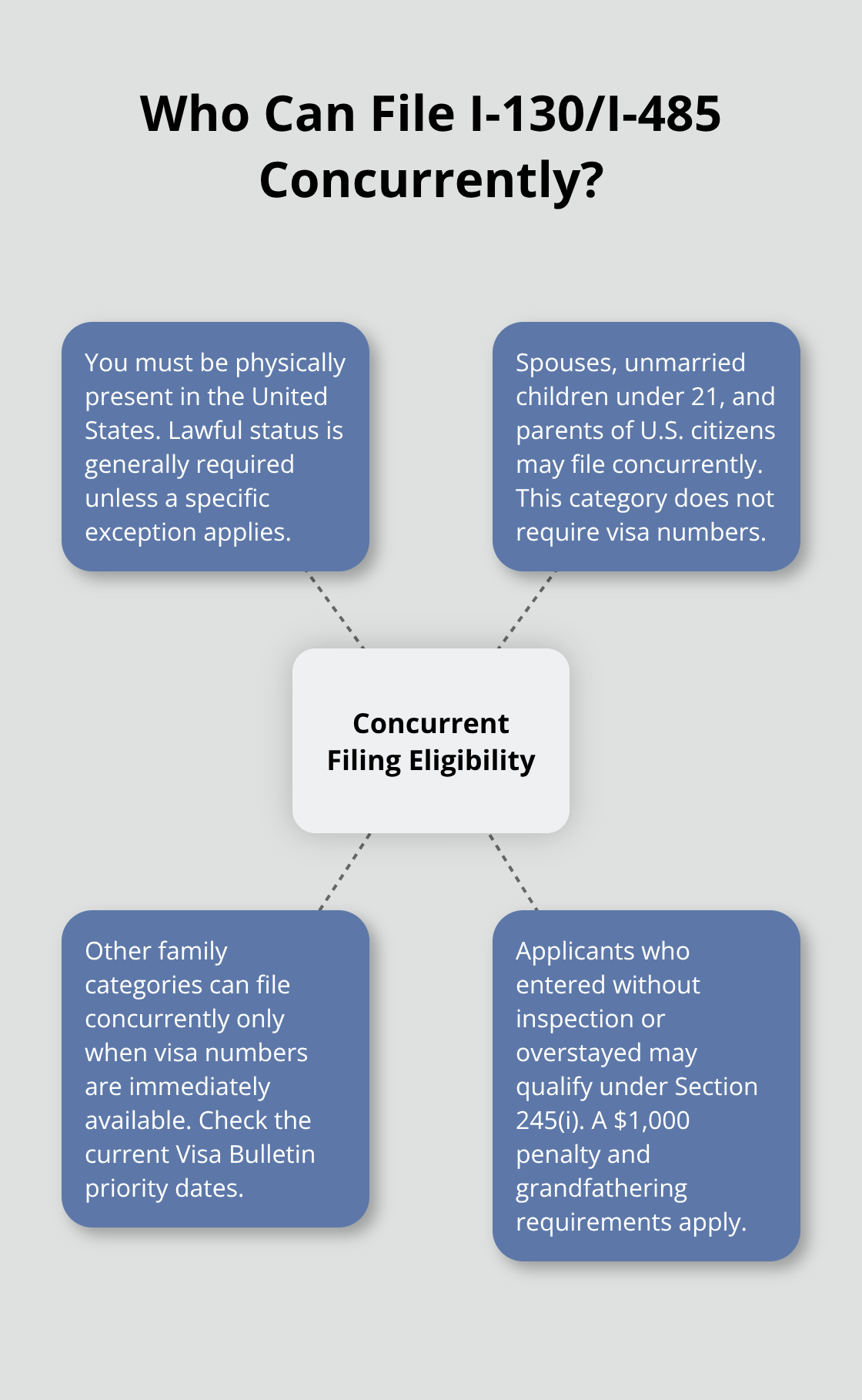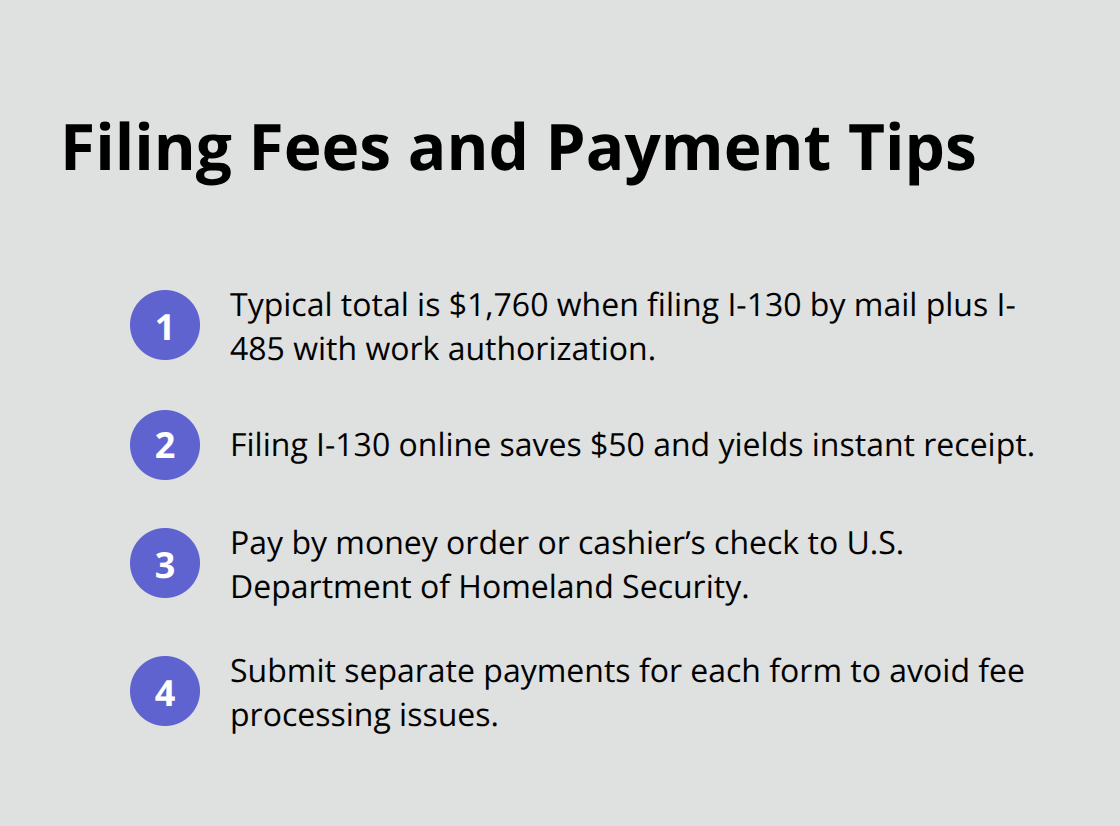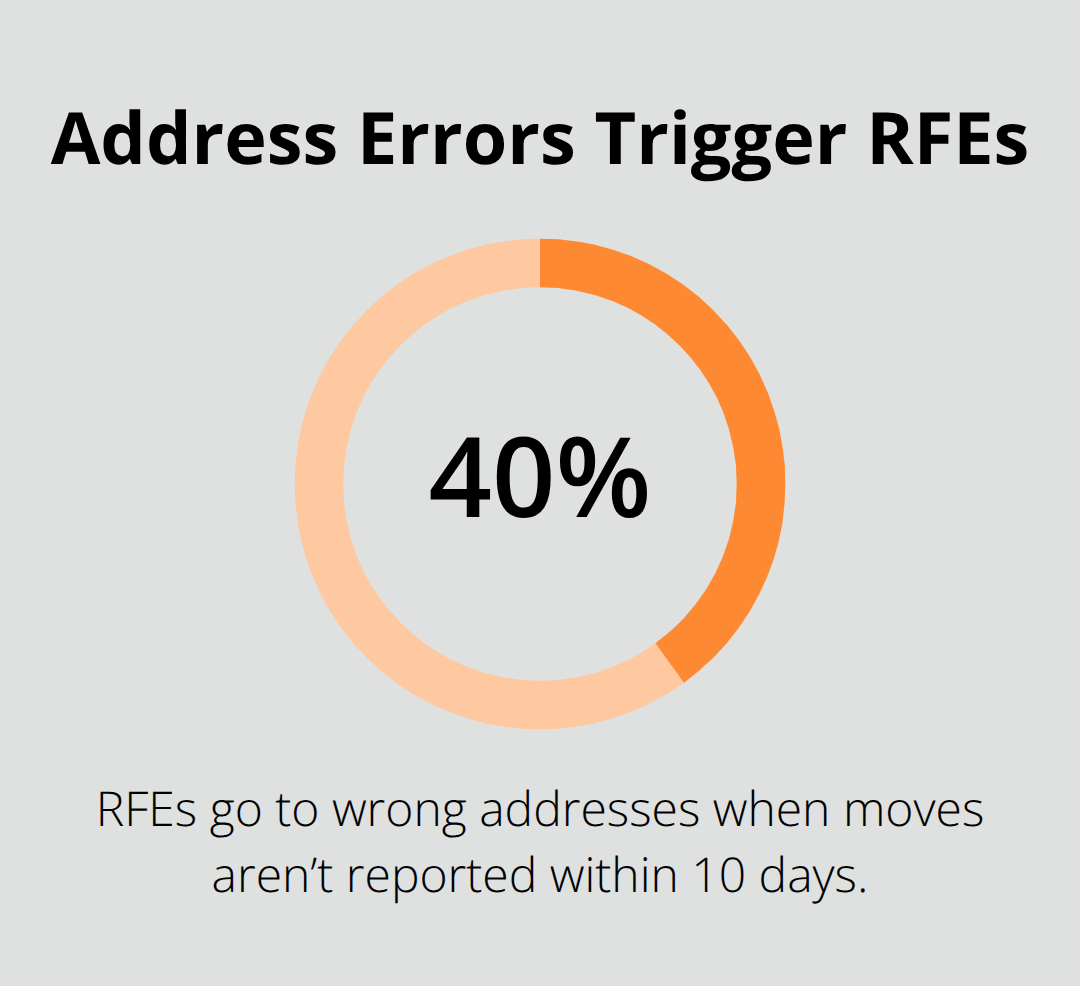
How to File I-130 with Adjustment of Status
Filing an I-130 adjustment of status petition allows U.S. citizens and permanent residents to help eligible family members obtain green cards without leaving the country. This concurrent filing process can save months of waiting time.
We at Law Offices of Jeffrey A. Thompson see families navigate this complex procedure daily. The key lies in proper documentation and meeting strict eligibility requirements.
What Forms Do You Actually Need?
Form I-130 Establishes Your Family Relationship
Form I-130 serves as the foundation document that proves your qualifying family relationship with a U.S. citizen or permanent resident. This petition establishes the legal basis for immigration benefits and must precede any green card application. The form requires extensive documentation including marriage certificates, birth certificates, and proof of the petitioner’s citizenship or permanent resident status.
USCIS processes I-130 petitions for family-based immigration cases with detailed tracking by preference category and country. The petition costs $675 when you file by mail or $625 when you file online (a $50 savings that most applicants overlook).
Adjustment of Status Keeps Families Together in America
Adjustment of status through Form I-485 allows eligible foreign nationals already present in the United States to obtain permanent residence without travel abroad for consular processing. This process prevents family separation and eliminates the risks that come with international travel during immigration proceedings.
Immediate relatives of U.S. citizens can file I-485 concurrently with I-130 because no visa numbers are required for this category. Other family preference categories must wait for visa availability according to the monthly Visa Bulletin that the State Department publishes.
Concurrent Filing Eligibility Depends on Your Specific Category
Concurrent filing requires the beneficiary to be physically present in the United States and have maintained lawful status or qualify for specific exceptions. Immediate relatives including spouses, unmarried children under 21, and parents of U.S. citizens can always file concurrently regardless of their current status.

Family preference categories can only file concurrently when visa numbers are immediately available according to the current Visa Bulletin priority dates. Applicants who entered without inspection or overstayed their authorized period may still qualify under Section 245(i) if they pay an additional $1,000 penalty fee and meet specific grandfather provisions.
Current processing times for I-485 applications range from 13 to 25 months depending on the field office, which makes concurrent filing particularly advantageous for eligible applicants. The next step involves gathering all required documents and completing each form accurately to avoid delays that could affect your green card timeline.
How Do You Complete the Filing Process
Gather Your I-130 Documentation Package
Form I-130 demands specific relationship documents that change based on your family category. Spouses must provide marriage certificates, divorce decrees from previous marriages, and joint financial records such as tax returns or bank statements. Parents who petition for children need birth certificates that show both parents’ names, while children who petition for parents must submit their own birth certificate plus proof of the parent’s relationship. Missing or insufficient evidence, especially in proving relationships, leads to green card denials according to processing statistics.
The petitioner must prove their U.S. citizenship or permanent resident status with a passport, naturalization certificate, or green card copy. Foreign documents need certified English translations from qualified translators. Submit photocopies only unless USCIS specifically requests originals, as mailed originals often disappear during processing. Include Form I-130A if you petition for a spouse who lives outside the United States.
Complete Your I-485 Adjustment Application
Form I-485 spans 18 pages and demands precise answers about your immigration history, criminal background, and medical examination results. The medical exam that uses Form I-693 must be completed by a USCIS-designated civil surgeon before you file, with costs that range from $200 to $500 depending on your location and required vaccinations. Schedule this exam early since some vaccinations require multiple doses over several weeks.
Part 2 of I-485 asks about your current immigration status and any violations. Answer truthfully about overstays or unauthorized work, as USCIS cross-references your responses with existing records. Include Form I-765 for work authorization and Form I-131 for travel permission if you need them during processing. These additional forms cost $410 and $630 respectively but provide valuable benefits while your case remains pending.
Calculate Filing Fees and Payment Strategy
The total package costs $1,760 for most applicants when you file I-130 by mail plus I-485 with work authorization. You save $50 when you file I-130 online and receive immediate receipt confirmation. Pay with money orders or cashier’s checks made payable to U.S. Department of Homeland Security, as personal checks often cause processing delays. Include separate payments for each form since USCIS processes fees independently and may cash them weeks apart.

Even with perfect documentation, common mistakes can derail your application and add months to your timeline.
What Filing Mistakes Cost You Months of Delays
Documentation Errors Sink Applications Before Review
USCIS rejects applications due to incomplete documentation according to agency processing statistics. Missing signatures alone account for thousands of rejections annually, yet applicants continue to submit unsigned forms. Check every signature line on both I-130 and I-485 before you mail them, as USCIS will not contact you for missing signatures – they simply reject the entire package and return your fees.
Birth certificates from foreign countries cause the most relationship proof problems. USCIS requires long-form certificates that show both parents’ names, not short-form abstracts that many countries issue by default. Order certified copies directly from vital records offices, never rely on hospital certificates or baptismal records. Translation errors multiply these problems when translators misinterpret official seals or government terminology. Use certified legal translators who specialize in immigration documents, not general language services.
Address Changes and Response Deadlines Create Processing Nightmares
USCIS requires address updates within 10 days of a move, yet 40% of Request for Evidence notices go to wrong addresses according to processing data. Update your address online through the USCIS website immediately after you move, then follow up with written notification to your processing center. Failed address updates cause automatic denials when you miss RFE response deadlines.

Response deadlines for additional evidence requests are non-negotiable. USCIS allows 84 days to respond to most RFEs, with no extensions for holidays or postal delays. Mail responses with certified mail and return receipts (include copies of your original receipt notice). Missing an RFE deadline results in automatic denial with no appeal rights – you must restart the entire process with new fees.
Professional Legal Help Prevents Costly Mistakes
Complex immigration histories require professional evaluation before you file. Applicants with prior deportation orders, criminal arrests, or immigration violations often file adjustment applications that face automatic denial. Immigration attorneys identify these issues during initial consultations and determine whether waivers or alternative strategies offer better success rates. The cost of legal consultation is minimal compared to losing $1,760 in fees plus additional years of separation (especially when you consider the emotional toll on families).
Missing documents or incomplete forms trigger automatic rejections that cost months of delays and additional fees.
Final Thoughts
I-130 adjustment of status applications demand precise documentation, correct fees, and strict deadline compliance. The concurrent process saves months compared to consular processing, but success depends on complete evidence packages and accurate forms. Processing times currently span 13 to 25 months for I-485 applications, though concurrent submissions often move faster than sequential filings.
USCIS schedules biometrics appointments within 2-3 months after you file, followed by potential interviews based on case complexity. You must monitor your case status online with receipt numbers and respond immediately to any requests for additional evidence. Address changes require reports within 10 days to prevent missed communications that could destroy your application (this single mistake causes thousands of denials annually).
We at Law Offices of Jeffrey A. Thompson help families navigate these complex immigration procedures daily. Professional legal guidance becomes invaluable when you face prior immigration violations, criminal history, or unusual circumstances that could complicate your adjustment application. Expert assistance prevents costly mistakes that could separate families for years.


